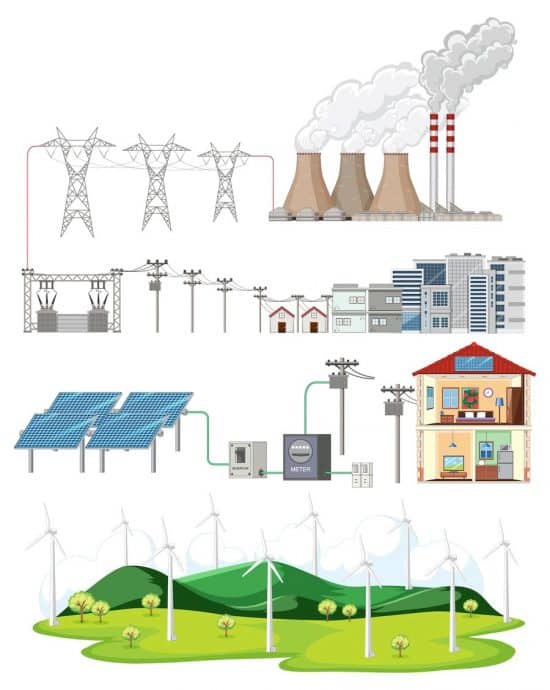Introduction: AI and Power Grids.
AI and Power Grids: Modern power grids are growing in complexity, with increasing demands being placed on intermittent power sources. Here’s where AI comes to the rescue. AI, or artificial intelligence, analyzes historical and current energy production, weather, climate, and consumption. It then gives an accurate prediction about energy demand and supply.
Artificial intelligence is an extensive branch of computer science working to build intelligent machines, which are capable of executing tasks that otherwise require human intelligence.
A power grid is an interconnected electrical network that generates and distributes electricity over a large area. Power grids vary in size, covering entire countries or even continents. They consist of power generation and distribution infrastructure. The interconnection of generating stations minimizes the reserve generation capacity/spinning reserve in each area.
Also Read: Self taught AI will be the end of us
Table of contents
Power Management with AI
The use of AI techniques started many years ago when designers adopted digital signal processors (DSPs) into their power supply designs. This was the initial form of AI in the energy sector.
From the use of large transistors, power management transitioned to digital power integrated circuits (ICs). Currently, many circuit designers prefer to use digital power IC systems where the power management bus (PMBus) is integrated into the IC.
Complete transition to AI will be the next major development in power management. The transition is inevitable, but designers need to take one step at a time as they contemplate an alternative reliable system to replace a backfired AI function and keep a mission-critical system running.
Also Read: AI ethics and laws
AI and Power Grids
Grid operators and asset managers struggle to calculate the optimal energy output required for system load at the minimum possible cost despite transmission and operational constraints. This is a process called economic dispatch.
It is a progressive process requiring continuous calibration as changes in weather and grid conditions occur.
AI can handle the same role autonomously and in real-time, ensuring reliable energy delivery at a lower price. For example, AI detects a downed power line during a storm and conveys emergency power backup from nearby micro-grids thereby keeping the residents from experiencing a blackout.
Also Read: Impact of AI in Smart Homes
Predictive Analytics
AI can help grid operators manage uncertainties brought about by extreme weather, equipment failures, or fluctuating quantities of renewable energy.
AI uses cumulative data from scheduled daily and hourly power generation findings to create patterns that can be used for future planning.
AI can inform energy traders about power prices near or far into the future, giving them an advantage in energy trading.
The Five Advantages of Using AI in Power Grids
The use of AI in power grids has a number of benefits in various situations. Let us discuss the common reasons why AI is preferred for power grids.
Efficiency and Cost Reduction
AI transmits commands and detects any irregularities in the power flow, thus cutting down waste and lowering energy costs. It also facilitates and speeds up the use of renewable energy sources.
Planning
AI can predict weather patterns and system failures likely to affect energy output. Such analyses help to reduce risks, prepare for change, save power, lower costs, and enhance customer experience.
AI also gives a competitive advantage to those who implement it on energy trading platforms.
Preventing Disaster
AI identifies and predicts maintenance hurdles requiring attention such as faulty lines, failing transformers, system overloads, or potential hazards. Timely action is then taken, preventing damage to the environment and people.
Digital Collection and Analysis of Data
The energy sector has lots of data that humans would take a long time to collect and analyze. AI digitally collects historical and current data and analyzes them to create valuable insights.
Reliability
AI ensures consistent energy supply even when energy sources fluctuate. It also optimizes energy storage to ensure a steady supply for the increasing population.
Also Read: Smart Farming using AI and IoT
Reducing Risks with AI in Power Grids
Carbon Monoxide Reduction
AI creates a reliable supply of renewable energy sources. More people will shift to renewable energy sources as the cheaper option. This will decrease the use of fossil energy and thus lower the amount of carbon monoxide released into the atmosphere.
One AI software, created by AI software company C3.ai, assists the reduction of a power grid’s carbon emissions by cutting down its fuel requirement by 8%. Thus, AI delivers cleaner, safer, and more reliable energy with little environmental impact.
Curbing Energy Theft
Customers can steal energy by using more electricity than their meter reports. Some people also create rogue connections and steal energy from paying clients. AI automatically detects any form of theft and raises the alarm.
Detecting Cyber Attacks
AI can differentiate between system faults and cyber-attacks. Detecting cyber-attacks can help prevent the compromising of data and the hijacking of operations.
Watch hackers break into US power grid.
Also Read: Love, AI and Robots – Love stories from the future.
Improving Sustainability by Using AI in Power Grids
AI helps to improve sustainability by facilitating the use of renewable energy sources such as wind, solar, etc. AI-managed smart grids allow consumers to optimize their consumption and storage, while AI-prediction analyses can help prepare for future deficits.
Overall, AI shows promise for transforming the energy sector into a safer, more efficient, and sustainable service for the decades to come.
Also Read: Amazon is using AI in almost everything it does.
Also Read: Animals interact with AI robots.
Also Read: What are smart cities?
Also Read: AI and Cybersecurity
Also Read: Artificial Intelligence and Urban Design
Also Read: Artificial intelligence & algorithms: pros & cons | DW Documentary (AI documentary) .
